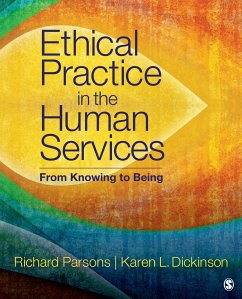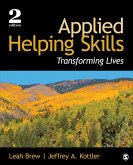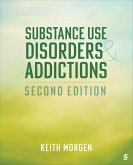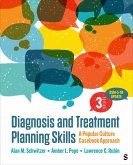Schade – dieser Artikel ist leider ausverkauft. Sobald wir wissen, ob und wann der Artikel wieder verfügbar ist, informieren wir Sie an dieser Stelle.
- Broschiertes Buch
- Merkliste
- Auf die Merkliste
- Bewerten Bewerten
- Teilen
- Produkt teilen
- Produkterinnerung
- Produkterinnerung
With coverage of ethical standards from six different associations, the text addresses ethical issues and principles in social work, counseling, psychology, and marriage and family therapy.
Andere Kunden interessierten sich auch für
![The Human Services Internship Experience The Human Services Internship Experience]() Marianne R WoodsideThe Human Services Internship Experience192,99 €
Marianne R WoodsideThe Human Services Internship Experience192,99 €![Applied Helping Skills Applied Helping Skills]() Leah M BrewApplied Helping Skills206,99 €
Leah M BrewApplied Helping Skills206,99 €![Becoming a Skilled Counselor Becoming a Skilled Counselor]() Richard D ParsonsBecoming a Skilled Counselor207,99 €
Richard D ParsonsBecoming a Skilled Counselor207,99 €![Counseling Adolescents Competently Counseling Adolescents Competently]() Lee Anthony UnderwoodCounseling Adolescents Competently122,99 €
Lee Anthony UnderwoodCounseling Adolescents Competently122,99 €![Substance Use Disorders and Addictions Substance Use Disorders and Addictions]() Keith J MorgenSubstance Use Disorders and Addictions165,99 €
Keith J MorgenSubstance Use Disorders and Addictions165,99 €![Diagnosis and Treatment Planning Skills Diagnosis and Treatment Planning Skills]() Alan M. SchwitzerDiagnosis and Treatment Planning Skills148,99 €
Alan M. SchwitzerDiagnosis and Treatment Planning Skills148,99 €![Group Activities for Families in Recovery Group Activities for Families in Recovery]() M J ZimmermanGroup Activities for Families in Recovery80,99 €
M J ZimmermanGroup Activities for Families in Recovery80,99 €-
-
-
With coverage of ethical standards from six different associations, the text addresses ethical issues and principles in social work, counseling, psychology, and marriage and family therapy.
Produktdetails
- Produktdetails
- Verlag: Sage Publications
- Seitenzahl: 416
- Erscheinungstermin: 1. Dezember 2016
- Englisch
- Abmessung: 231mm x 188mm x 20mm
- Gewicht: 680g
- ISBN-13: 9781506332918
- ISBN-10: 1506332919
- Artikelnr.: 45007760
- Herstellerkennzeichnung
- Libri GmbH
- Europaallee 1
- 36244 Bad Hersfeld
- gpsr@libri.de
- Verlag: Sage Publications
- Seitenzahl: 416
- Erscheinungstermin: 1. Dezember 2016
- Englisch
- Abmessung: 231mm x 188mm x 20mm
- Gewicht: 680g
- ISBN-13: 9781506332918
- ISBN-10: 1506332919
- Artikelnr.: 45007760
- Herstellerkennzeichnung
- Libri GmbH
- Europaallee 1
- 36244 Bad Hersfeld
- gpsr@libri.de
Richard D. Parsons, Ph.D. is a Full Professor in the Counselor Education Department at West Chester University. Dr. Parsons has over 45 years of university teaching in counselor preparation programs. Prior to his University teaching Dr. Parsons spent 9 years as a school counselor in an inner-city high school.
Part One: Helping: The Role and Influence of the Helper
Chapter 1: Ethics - Core to Professional Helping
The Helping Process: A Blending of Art and Science
The Helping Process: The Meeting of Client and Helper
The Role of the Client in the Process of Change
The Role of the Helper in the Process of Change
Chapter 2: Helper Variables: What the Helper Brings to the Helping
Relationship
Helper Values
Helper Competence: Beyond Knowledge and Skill
The Ethics of Therapeutic Choice
Professionalization, Professional Ethics, and Personal Response
Chapter 3: Ethical Standards: Guidelines for Helping Others
Formal Ethical Standards: The Evolution of a Profession
Across the Professions: A Review of Ethical Standards of Practice
Common Concerns and Shared Values Across the Professions
Beyond Knowing - A Call to BEING Ethical
Chapter 4: Ethical Practice in an Increasingly Diverse World
Prejudice - Pervasive In and Throughout the Helping Profession
Responding to the Challenge
Part Two: Ethics and Standards of Practice: The Professions'
Chapter 5: Ethics and the Law
The Helping Process as a Legal Contract
The Legal Foundation of Ethical Practice
When Ethics and Legalities Collide
Chapter 6: Conflict: The Reality of 'Being' Ethical within the Real World
Serving the Individual within a System
Ethical Culture of Social Systems
Who Is the Client?
Chapter 7: Ethical Decision Making
Codes of Ethics - Guides not Prescriptions
Ethical Decision Making: A Range of Models
Common Elements: An Integrated Approach to Ethical Decision Making
Part Three: Applying Ethical Standards
Chapter 8: Informed Consent
The Rationale for Informed Consent
Informed Consent across the Profession
Special Challenges to Informing for Consent
Chapter 9: Confidentiality
Confidentiality: What and When Warranted?
Legal Decisions: Confidentiality and Privileged Communications
Chapter 10: Boundaries and the Use of Power
Setting and Maintaining Professional Boundaries
Professional Objectivity: Essential to Professional Boundaries
Legal Decisions
Chapter 11: Efficacy of Treatment
Practicing Within the Realm of Competence
Professional Development: Knowing the State of the Profession
The Standard of Care: Appropriate Treatment
Employing an Action Research Approach to Practice
The Use of Referral
Recent Legal Decisions
Chapter 12: Evaluation and Accountability
Monitoring and Evaluating Intervention Effects
Recent Legal Decisions
Chapter 13: Ethical Challenges Working with Groups, Couples and Families
Competency to Practice
Identifying the "Client"
Informed Consent
Confidentiality
Boundaries
Responsibility: Client Welfare
Chapter 14: Competence and the Ethics of Self-Care
Competency: More than Knowledge and Skill
Burnout
Compassion Fatigue
The Ethical Challenge
Ethical Response
Chapter 1: Ethics - Core to Professional Helping
The Helping Process: A Blending of Art and Science
The Helping Process: The Meeting of Client and Helper
The Role of the Client in the Process of Change
The Role of the Helper in the Process of Change
Chapter 2: Helper Variables: What the Helper Brings to the Helping
Relationship
Helper Values
Helper Competence: Beyond Knowledge and Skill
The Ethics of Therapeutic Choice
Professionalization, Professional Ethics, and Personal Response
Chapter 3: Ethical Standards: Guidelines for Helping Others
Formal Ethical Standards: The Evolution of a Profession
Across the Professions: A Review of Ethical Standards of Practice
Common Concerns and Shared Values Across the Professions
Beyond Knowing - A Call to BEING Ethical
Chapter 4: Ethical Practice in an Increasingly Diverse World
Prejudice - Pervasive In and Throughout the Helping Profession
Responding to the Challenge
Part Two: Ethics and Standards of Practice: The Professions'
Chapter 5: Ethics and the Law
The Helping Process as a Legal Contract
The Legal Foundation of Ethical Practice
When Ethics and Legalities Collide
Chapter 6: Conflict: The Reality of 'Being' Ethical within the Real World
Serving the Individual within a System
Ethical Culture of Social Systems
Who Is the Client?
Chapter 7: Ethical Decision Making
Codes of Ethics - Guides not Prescriptions
Ethical Decision Making: A Range of Models
Common Elements: An Integrated Approach to Ethical Decision Making
Part Three: Applying Ethical Standards
Chapter 8: Informed Consent
The Rationale for Informed Consent
Informed Consent across the Profession
Special Challenges to Informing for Consent
Chapter 9: Confidentiality
Confidentiality: What and When Warranted?
Legal Decisions: Confidentiality and Privileged Communications
Chapter 10: Boundaries and the Use of Power
Setting and Maintaining Professional Boundaries
Professional Objectivity: Essential to Professional Boundaries
Legal Decisions
Chapter 11: Efficacy of Treatment
Practicing Within the Realm of Competence
Professional Development: Knowing the State of the Profession
The Standard of Care: Appropriate Treatment
Employing an Action Research Approach to Practice
The Use of Referral
Recent Legal Decisions
Chapter 12: Evaluation and Accountability
Monitoring and Evaluating Intervention Effects
Recent Legal Decisions
Chapter 13: Ethical Challenges Working with Groups, Couples and Families
Competency to Practice
Identifying the "Client"
Informed Consent
Confidentiality
Boundaries
Responsibility: Client Welfare
Chapter 14: Competence and the Ethics of Self-Care
Competency: More than Knowledge and Skill
Burnout
Compassion Fatigue
The Ethical Challenge
Ethical Response
Part One: Helping: The Role and Influence of the Helper
Chapter 1: Ethics - Core to Professional Helping
The Helping Process: A Blending of Art and Science
The Helping Process: The Meeting of Client and Helper
The Role of the Client in the Process of Change
The Role of the Helper in the Process of Change
Chapter 2: Helper Variables: What the Helper Brings to the Helping
Relationship
Helper Values
Helper Competence: Beyond Knowledge and Skill
The Ethics of Therapeutic Choice
Professionalization, Professional Ethics, and Personal Response
Chapter 3: Ethical Standards: Guidelines for Helping Others
Formal Ethical Standards: The Evolution of a Profession
Across the Professions: A Review of Ethical Standards of Practice
Common Concerns and Shared Values Across the Professions
Beyond Knowing - A Call to BEING Ethical
Chapter 4: Ethical Practice in an Increasingly Diverse World
Prejudice - Pervasive In and Throughout the Helping Profession
Responding to the Challenge
Part Two: Ethics and Standards of Practice: The Professions'
Chapter 5: Ethics and the Law
The Helping Process as a Legal Contract
The Legal Foundation of Ethical Practice
When Ethics and Legalities Collide
Chapter 6: Conflict: The Reality of 'Being' Ethical within the Real World
Serving the Individual within a System
Ethical Culture of Social Systems
Who Is the Client?
Chapter 7: Ethical Decision Making
Codes of Ethics - Guides not Prescriptions
Ethical Decision Making: A Range of Models
Common Elements: An Integrated Approach to Ethical Decision Making
Part Three: Applying Ethical Standards
Chapter 8: Informed Consent
The Rationale for Informed Consent
Informed Consent across the Profession
Special Challenges to Informing for Consent
Chapter 9: Confidentiality
Confidentiality: What and When Warranted?
Legal Decisions: Confidentiality and Privileged Communications
Chapter 10: Boundaries and the Use of Power
Setting and Maintaining Professional Boundaries
Professional Objectivity: Essential to Professional Boundaries
Legal Decisions
Chapter 11: Efficacy of Treatment
Practicing Within the Realm of Competence
Professional Development: Knowing the State of the Profession
The Standard of Care: Appropriate Treatment
Employing an Action Research Approach to Practice
The Use of Referral
Recent Legal Decisions
Chapter 12: Evaluation and Accountability
Monitoring and Evaluating Intervention Effects
Recent Legal Decisions
Chapter 13: Ethical Challenges Working with Groups, Couples and Families
Competency to Practice
Identifying the "Client"
Informed Consent
Confidentiality
Boundaries
Responsibility: Client Welfare
Chapter 14: Competence and the Ethics of Self-Care
Competency: More than Knowledge and Skill
Burnout
Compassion Fatigue
The Ethical Challenge
Ethical Response
Chapter 1: Ethics - Core to Professional Helping
The Helping Process: A Blending of Art and Science
The Helping Process: The Meeting of Client and Helper
The Role of the Client in the Process of Change
The Role of the Helper in the Process of Change
Chapter 2: Helper Variables: What the Helper Brings to the Helping
Relationship
Helper Values
Helper Competence: Beyond Knowledge and Skill
The Ethics of Therapeutic Choice
Professionalization, Professional Ethics, and Personal Response
Chapter 3: Ethical Standards: Guidelines for Helping Others
Formal Ethical Standards: The Evolution of a Profession
Across the Professions: A Review of Ethical Standards of Practice
Common Concerns and Shared Values Across the Professions
Beyond Knowing - A Call to BEING Ethical
Chapter 4: Ethical Practice in an Increasingly Diverse World
Prejudice - Pervasive In and Throughout the Helping Profession
Responding to the Challenge
Part Two: Ethics and Standards of Practice: The Professions'
Chapter 5: Ethics and the Law
The Helping Process as a Legal Contract
The Legal Foundation of Ethical Practice
When Ethics and Legalities Collide
Chapter 6: Conflict: The Reality of 'Being' Ethical within the Real World
Serving the Individual within a System
Ethical Culture of Social Systems
Who Is the Client?
Chapter 7: Ethical Decision Making
Codes of Ethics - Guides not Prescriptions
Ethical Decision Making: A Range of Models
Common Elements: An Integrated Approach to Ethical Decision Making
Part Three: Applying Ethical Standards
Chapter 8: Informed Consent
The Rationale for Informed Consent
Informed Consent across the Profession
Special Challenges to Informing for Consent
Chapter 9: Confidentiality
Confidentiality: What and When Warranted?
Legal Decisions: Confidentiality and Privileged Communications
Chapter 10: Boundaries and the Use of Power
Setting and Maintaining Professional Boundaries
Professional Objectivity: Essential to Professional Boundaries
Legal Decisions
Chapter 11: Efficacy of Treatment
Practicing Within the Realm of Competence
Professional Development: Knowing the State of the Profession
The Standard of Care: Appropriate Treatment
Employing an Action Research Approach to Practice
The Use of Referral
Recent Legal Decisions
Chapter 12: Evaluation and Accountability
Monitoring and Evaluating Intervention Effects
Recent Legal Decisions
Chapter 13: Ethical Challenges Working with Groups, Couples and Families
Competency to Practice
Identifying the "Client"
Informed Consent
Confidentiality
Boundaries
Responsibility: Client Welfare
Chapter 14: Competence and the Ethics of Self-Care
Competency: More than Knowledge and Skill
Burnout
Compassion Fatigue
The Ethical Challenge
Ethical Response








